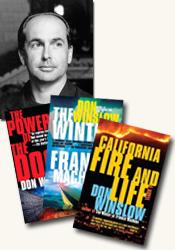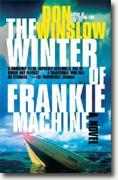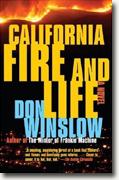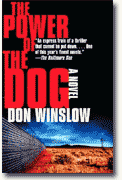author interview
book reviews:
· general fiction
· chick lit/romance
· sci-fi/fantasy
· graphic novels
· nonfiction
· audio books
· author interviews
· children's books @
curledupkids.com
· DVD reviews @
curledupdvd.com
newsletter
win books
buy online
links
home
for authors
& publishiss
for reviewers

|
|||||
 
Luan Gaines interviewed author Don Winslow about his novels
The Winter of Frankie Machine Interviewer Luan Gaines: Where do you find inspiration for your novels? Don Winslow: Living where we do, when we do, there’s no shortage of inspiration. The problem is trying to find time to write all the novels swimming around in your head. Southern California seems to be familiar territory: the California-Mexican border (The Power of the Dog Very. I’m fascinated by Southern California, in its geographical, cultural, economic and ethnic diversity. It’s also where the American Dream ends, where people go to reinvent themselves. It’s also flat-out beautiful. Your protagonists, Art Keller, Jack Wade and Frank Machianno, are deeply flawed, rebellious and independent. What particular traits do you require in such lead characters? They have to want something, and that ‘something’ has to come from some need inside them, usually related to the flaws you mentioned. They also have to have a sense of honor – it might not be the code that we share, but they have to feel it deeply and act in accordance.
I talk to people. Frankie Machine is one of your most dramatic characters, his old life reaching out to poison the present. How does Frank reflect the complexities of life and the consequences of the choices we make? In an almost Buddhist sense, we carry our karma around with us. Sooner or later, we’ll have to deal with the consequences of our actions, whether they’re positive or negative. Frankie’s no different in this regard. I think what makes him interesting is his specific mob past – and that he comes to realize that the mob code was nonsense and that he largely wasted his life. The Winter of Frankie Machine Most people get out of the mob over generations, and move on to legitimate livings. Some don’t, and the kids who stayed in are not particularly the best and the brightest. There’s also a Darwinist factor involved – if an idiot marries and idiot, they produce... As for our fascination with the mob, I think it has to do with fantasies of power. On a fantasy level, it would be nice to resolve our problems and conflicts with a Brando or Pacino-like nod of the head. You know, ‘make it thus.’ The reality, of course, is far different, and most people wouldn’t do it even if they could. But the fantasy of power is intriguing. You tread easily on the dark side, but your protagonists inevitably have redemptive qualities that allow the reader to root for them. How do you balance the kind of brutality you write about with good storytelling? Well, thanks. Human beings are rarely one-dimensional. Most have bad qualities and good – redeeming – qualities. In any case, I don’t think it’s good enough to point at a character and say ‘He’s bad’ and leave it at that. I think you end up with a silhouette – a one-dimensional black figure on a field of our own lily-white purity. It’s boring. I think we have to at least try to see the world through that character’s eyes. We may not like or approve of the view – we rarely do – but we have to at least try to see it and show it. Which of your novels so far has presented the greatest challenge? How did you resolve it? The Power of the Dog
For one thing, it makes a good story. The deeper answer is that I really don’t like the ‘beautiful people’ and couldn’t care less about their much-publicized ‘struggles’, what color Mercedes they’re going to buy, their troubles with their nannies and personal trainers or their stints at five-star rehabs. I certainly think it makes for boring fiction. I come from blue and khaki collar people, and my interests and empathies are with people who get up in the morning, go to work, and try to make a life - and these corrupt politicians, thieving business executives and greedy #@%@^’s should be stood up against a wall and shot. Now, there’s an episode of ET that I’d watch. Okay, that was hyperbolic (I’m against capital punishment), but it was satisfying to type. You are a master of twisted endings. Do you plan these surprises at the start of the process or do such ideas evolve as you work? I have no clue what’s going to happen. God send I were that organized. Which is more dangerous in your opinion - mobsters or politicians? Why? What part does the government play in crime and corruption? How does government interference hamper or assist your protagonists in these three novels? Government or the mob? Which is more dangerous? Are you kidding? Mobsters only wish they had the power of compulsion, potential for lethal violence and license to steal that governments have. It would be their dream. You don’t want to get me started on this. I could – and, I guess, have – written volumes on it (Power of the Dog Most of your protagonists are male, but in California Fire and Life Indeed, most of my characters are male, because I am. But I think I write strong women. Letty in Cal Fire So far you have dipped into the ineffective War on Drugs, the pervasive tentacles of the Russian mob and related criminal activities in southern California and the entrenched mob mentality in San Diego, with ties to Chicago and Detroit. Are there any other relevant topics you would like to explore in novel form? Currently I’m writing about child prostitution. Have any particular authors influenced your work? All of them. In large measure, we are what we read.
I’m only at liberty to discuss one – I’m making the film version of my first book, ‘A Cool Breeze On The Underground,’ myself, and am currently on the search for a director. It’s a fascinating process. Given that your protagonists share a love of surfing, it isn’t too big a leap to imagine it is something you love as well. Yes? Does being in the ocean help you focus, either on your work or on your life in general? Well, I’m a totally crap surfer. I mostly fall and swim. But I’ve been doing it in one form or another all my life. Mostly I do it for just fun, but, yeah, I think the ocean does help me focus and relax. There’s nothing like coming out of the water after a good session, taking a hot shower, being ravenously hungry for a good meal, and then crashing. Are you currently working on another novel? If so, can you share something about it with us? Yeah, it’s called ‘The Dawn Patrol’, and it’s about a group of surfers in Pacific Beach, one of whom is a P.I who catches a case that forces him and his friends to grow up and confront life outside the water. Do you have any advice for would-be writers? Write. I don’t mean to be glib. Writers write. I think that would-be writers sometimes get intimidated by the scale of the trying to write a novel. I’d tell them to take smaller bites – set a do-able number of pages a day to write (even if it’s only one page) and write it every day, no matter what, no excuses. They’d be shocked at how quickly they’ve produced a book. It’s a Nike thing – just do it. Don Winslow Don Winslow has worked as a private investigator in London, New York City, and elsewhere in the United States, and as a consultant to law firms and insurance companies for more than fifteen years. He lives with his wife, Jean, and son, Thomas, in Dana Point, CA and Riverton, CT. Luan Gaines is a freelance writer and contributing reviewer to curledup.com. Her interview with Don Winslow was written in conjunction with her reviews of The Winter of Frankie Machine, California Fire and Life and The Power of the Dog. © Luan Gaines/2007.
|
|||||
| fiction · sf/f · comic books · nonfiction · audio newsletter · free book contest · buy books online review index · links · · authors & publishiss reviewers |
|
| site by ELBO Computing Resources, Inc. | |



